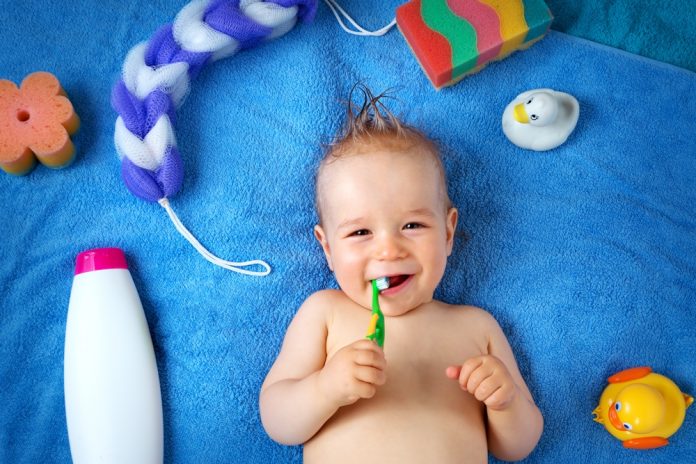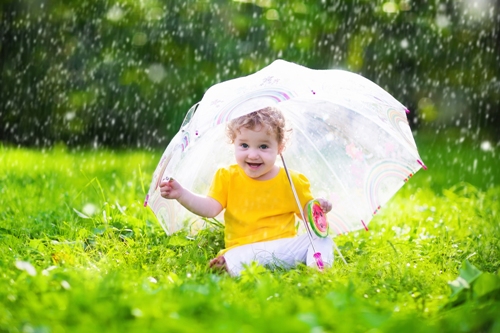This post is also available in: English हिन्दी (Hindi) বাংলা (Bengali)
Your baby has been agonizing and gnawing on everything in sight … Aah !..teething troubles.. and sure enough, the first little tooth peeps out. What a wonderful day it is for parents and the little one.. another milestone achieved!
Most babies gets their first tooth anywhere between 6-12 months.
It now becomes our duty as parents, to help keep the little one’s teeth clean and free of germs. Daily preventive care, including proper brushing, and a healthy balanced diet, will help stop problems before they develop. It is much less painful, expensive, and worrisome than treating conditions that have been allowed to progress.
Cleaning or brushing your child’s teeth helps remove the bacteria that cause decay.

Start to clean your baby’s teeth as soon as the first tooth comes through.
| Age | How to clean |
| 0-3 months | Clean your baby’s gums with a damp cloth or finger |
| 3 months to 1 year | Parents must use a soft finger brush to clean the baby’s gums |
| 1 to 2 years | Dentists recommend using a soft baby toothbrush with a non-fluoride toothpaste |
| 2 to 6 years | Use a small pea-sized amount of children’s low fluoride toothpaste on a small, soft toothbrush |
Brush the teeth and along the gum line twice a day; in the morning and at night before bed.
Children will need an adult to help them brush their teeth until they can do it well by themselves. Young children are more likely to clean their teeth regularly if it is a fun activity and part of their usual routine. There are various ways to keep the kids engaged –
- Singing songs about brushing
- Brushing with others (siblings or parents or even a toy)
- Using a special toothbrush with a print of their favourite animal or cartoon
Disease and decay

Tooth decay is caused when bacteria in mouth feed on the sugar lodged in between the teeth. These bacteria damage enamel (tooth surface), making them weak and produce holes in the teeth called “caries” or “cavities”
If detected early, it is possible to stop decay from getting worse. Early decay may not produce much symptoms. Later, toothache and increased sensitivity to temperature may occur as symptoms of advanced decay.
Chalky teeth and risk for tooth decay

Many children have ‘chalky teeth’. Teeth can become ‘chalky’ if the enamel doesn’t harden properly when the tooth is forming initially. Because these teeth are weaker, they have a much higher risk of tooth decay.
Rarely, they may signal calcium or vitamin D deficiency. This can be avoided by daily Vitamin D supplementation for infants, as advised by your child’s paediatrician.
Dental checks can spot early signs of tooth decay

It is recommended that children have a dental check by the time they turn two. Children should see a dentist once every year even if they have no problems with their teeth.
Key points to remember:
Start brushing your child’s teeth as soon as the first tooth pushes through.
All children should brush their teeth twice a day
Main drink for children should be water; avoid sugary food and drinks especially at night
Good oral hygiene results in a mouth that looks and smells healthy.
These simple things will set your child up for a lifetime of good oral health.
By
Dr. Shreya Sharma

Dr. Shreya Sharma is a childcare expert and an M. D. in Pediatrics, she is currently a Pediatrician with fellowship in Pediatric Endocrinology, Mumbai.
This post is also available in: English हिन्दी (Hindi) বাংলা (Bengali)










